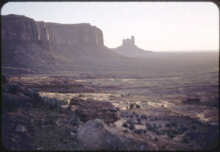Article
More commonly spelled as Hoskinini Mesa, this is a site located roughly between Monument Valley and Kayenta. Hoskinini was named after the well-known Navajo leader, Hashké neiní, born in the area of Monument Valley. In 1863, Kit Carson engaged in a campaign, now referred to as the Long Walk, whereby the Union Army forcibly removed Navajos from the Four Corners Region and forced them to walk over 300 miles to a new reservation in eastern New Mexico known as Bosque Redondo. Hoskinini and his band evaded capture and lived for four years in the Navajo Mountain region in Utah. Upon the release of the Navajo from Bosque Redondo, Hoskinini travelled back to Monument Valley, where he became known for his generosity to those Navajo who had survived their internment at Bosque Redondo. He died in 1912 in Monument Valley.
"Monument Valley and Hoskininni Mesa, Arizona circa 1950," photograph by Margaret Eiseman. (46771). Special Collections and Archives, Cline Library, Northern Arizona University.
Manuscripts
References
Adams, William Yewdale
1963 Shonto: A Study of the Role of the Trader in a Modern Navajo Community.
Washington, D.C.: U.S. Government Printing Office.
Nestor, Sandy
2004 Indian Placenames in America: Volume 1: Cities, Towns, and Villages: Booklist 100.
Northern Arizona University
2005 Navajo Leaders.
http://library.nau.edu/speccoll/exhibits/indigenous_voices/navajo/leade…, accessed
August 10, 2015.
San Juan School District
2003 Hoskinini.
http://dine.sanjuan.k12.ut.us/heritage/people/dine/biographies/hoskinin…, accessed
August 10, 2015.
Williams, Aubrey W.
1970 Navajo Political Process. Washington, D.C.: Smithsonian Institute Press.

